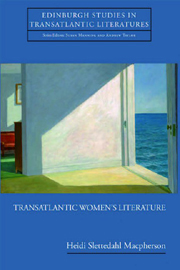Book contents
- Frontmatter
- Contents
- Acknowledgements
- Introduction: ‘No Region for Tourists and Women’
- Part 1: The Exoticised Other
- Part 2: Memoirs and Transatlantic Travel
- Introduction
- 3 ‘There is No World Outside the Text’: Transatlantic Slippage in Eva Hoffman's Lost in Translation
- 4 The Anti-Tourist: Jenny Diski's Skating to Antarctica and Stranger on a Train: Daydreaming and Smoking around America with Interruptions
- Part 3: Negotiating the Foreign/Re-Inventing Home
- Conclusion
- Bibliography
- Index
4 - The Anti-Tourist: Jenny Diski's Skating to Antarctica and Stranger on a Train: Daydreaming and Smoking around America with Interruptions
from Part 2: Memoirs and Transatlantic Travel
Published online by Cambridge University Press: 12 September 2012
- Frontmatter
- Contents
- Acknowledgements
- Introduction: ‘No Region for Tourists and Women’
- Part 1: The Exoticised Other
- Part 2: Memoirs and Transatlantic Travel
- Introduction
- 3 ‘There is No World Outside the Text’: Transatlantic Slippage in Eva Hoffman's Lost in Translation
- 4 The Anti-Tourist: Jenny Diski's Skating to Antarctica and Stranger on a Train: Daydreaming and Smoking around America with Interruptions
- Part 3: Negotiating the Foreign/Re-Inventing Home
- Conclusion
- Bibliography
- Index
Summary
If Eva Hoffman's memoir about dislocation in language and space is one that rails against such disjunctures (if unevenly, and with the knowledge that dislocation can also be beneficial), Jenny Diski's travel memoirs go so far as to celebrate the dislocating nature of travel, as well as the urge to position oneself as an outsider, peering in (or, turning away). Diski's travels to Antarctica and America, her encounters with strangers, and her determined proposition to remain a stranger herself, combine to offer up a narrator no less self-aware than Hoffman, and Skating to Antarctica and Stranger on a Train are texts that both engage in and resist their truth-telling tag. Indeed, though she offers up a portrait of herself as knowing, Diski is also a withholding author, who plays with the idea of discovery and revelation only to deny the ultimate effectiveness of both.
Like Hoffman, Diski is engaged with questions of mediated reality, and indeed at times in both travel memoirs, she offers up a Baudrillardian reading of her experience. In his travelogue America, Baudrillard suggests that:
It may be that the truth of America can only be seen by a European, since he [sic] alone will discover here the perfect simulacrum – that of the immanence and material transcription of all values. The Americans, for their part, have no sense of simulation. They are themselves simulation in its most developed state, but they have no language in which to describe it, since they themselves are the model.
- Type
- Chapter
- Information
- Transatlantic Women's Literature , pp. 106 - 126Publisher: Edinburgh University PressPrint publication year: 2008



